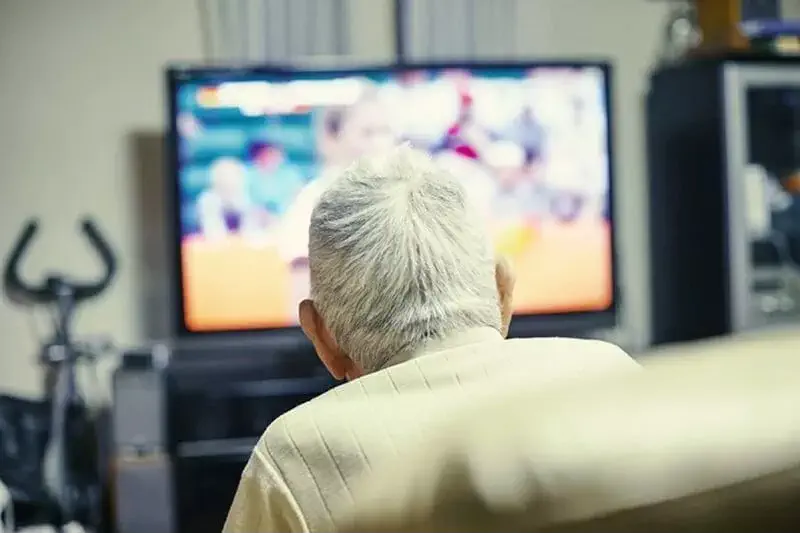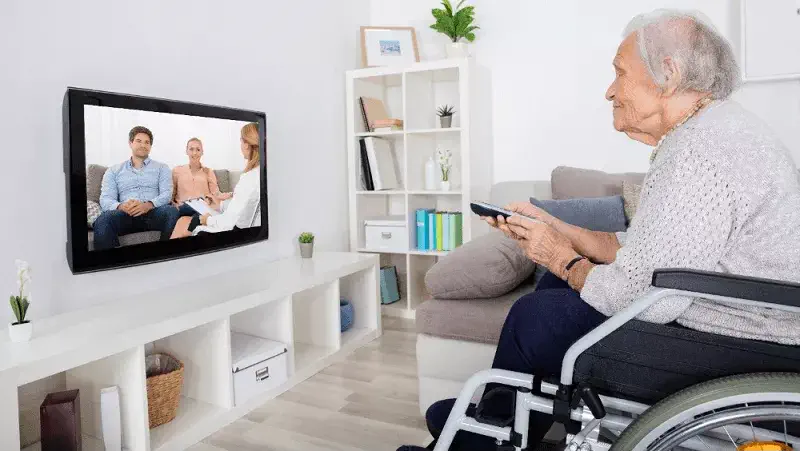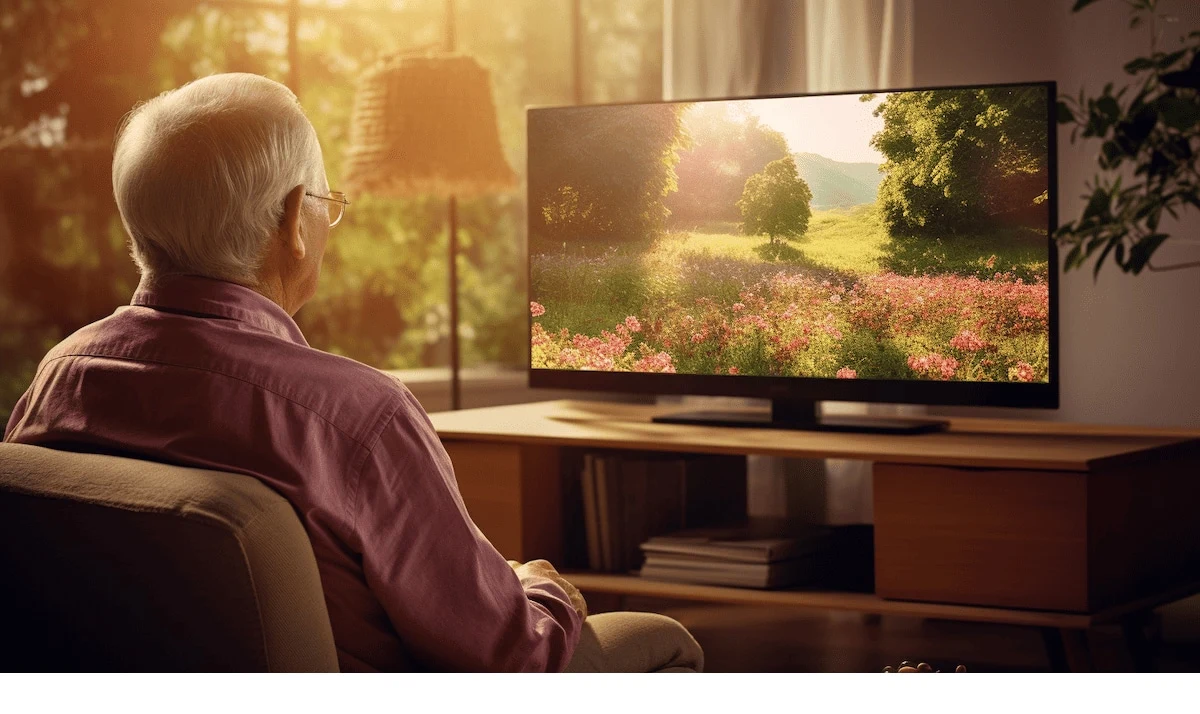
Complications of Watching Too Much TV in Elderly
Is too much TV bad for the elderly? What problems are caused by excessive tv watching for elderly? What are complications of watching too much TV in elderly? The best entertainment for the elderly can never be considered watching TV or playing chess. Perhaps it is better to make serious and fundamental changes in this culture so that aging and retirement do not mean resting, staying at home, and being inactive. Because aging and retirement mean reaching a time when you can enjoy your favorite activities in peace.
Therefore, it is better to have a complete and diverse program for the mental health of our elderly, in which watching series and watching movies and TV shows is only a part of it, rather than dedicating all of our elderly’s free time to it.
Considering mental health issues in elderly, it is not bad for dear elderly people to devote one or two hours to watching TV (or even less), while at the same time taking care of flowers and plants, taking walks, group activities for older adults and, etc., so that their bodies are more active. Never forget that watching too much TV can affect the quality of old age.
Among the elderly, watching too much TV and sitting for long periods of time leads to many complications, one of which is cardiovascular problems. In this article from the Human Health Mag website, we will discuss the complications of watching too much TV in the elderly.
Too Much Watching TV Linked with Heart Problems in the Elderly?!
Watching entertaining movies and TV series is enjoyable, but spending too much time watching them, in addition to a lack of time for other tasks, can lead to the formation of blood clots in the body in the future. In their latest research, experts have found that excessive TV watching in seniors can cause blood clots to form in people’s bodies, ultimately leading to a stroke or heart attack.
Experts from the University of Minnesota in the United States reached these conclusions by studying over 15,000 elderly volunteers and dividing them into different groups based on how long they watched TV. Prolonged sitting can cause blood clots because it disrupts the normal circulation of blood.

Experts have estimated the incidence of VTE (venous thromboembolism) in people who spend one to seven times more time in front of the TV than others. VTE is the formation of blood clots in the veins or a pulmonary embolism. It is said that the only way to combat this problem is to walk and exercise, even while watching TV.
Sitting and watching TV for just two hours a day can increase the risk of death from inflammation in people, especially the elderly, by up to 54%. In addition to the possibility of blood clots, inactivity and low physical activity can cause a buildup of toxins. Diseases such as brain diseases, Alzheimer’s, Parkinson’s, and diabetes, obesity in the elderly, and high blood pressure are more likely to occur in seniors who watch too much TV.
Another complication of watching too much TV in elderly is the occurrence of venous thrombosis and an increased risk of stroke and heart attack. Experts advise people, especially the elderly, to try not to spend long periods of time on a chair without moving, even when traveling. It is better for an elderly person to get up every two hours and walk around a bit to regulate blood flow in different tissues of their body.
Experts advise seniors who sit for more than two hours at a time to use socks that promote blood flow. These socks control blood flow and prevent your legs from going numb, which can lead to bleeding. According to statistics, several thousand people die annually from high blood pressure, and many of them die from heart valve disease and heart attack. Experts advise seniors to reduce their TV viewing time to maintain their health and instead focus on controlling their weight by engaging in physical activities.
Watching Too Much TV Causes Inactivity and Disability in Elderly
In a study, researchers analyzed data from men and women between the ages of 50 and 71. All participants were healthy at the start of the study. The researchers recorded the participants’ time spent watching TV, exercising, gardening, doing housework, or other physical activities and followed them for about 10 years. At the end of the study, they found that about 30% of the previously healthy seniors who had developed a habit of excessive TV viewing during this period had mobility disorders, specifically difficulty walking.
Researchers noted that seniors who watched 5 or more hours of TV per day had a 65% higher level of physical inactivity at the end of the study compared to those who watched less TV. Therefore, it can be concluded that inactivity in seniors will lead to an inability to walk. And this was another side effect of watching too much TV in elderly.

Other Complications of Watching Too Much TV in Elderly
Extended periods of watching television, especially in the evening, can be one of the most dangerous habits for seniors, as it makes them susceptible to injuries caused by a lack of physical activity.
Social Isolation in Seniors
Research shows that people who watch too much television feel lonely, isolated, and depressed. In addition to excessive TV use, other electronic devices like mobile phones and computers have the exact same effects on your senior loved one.
The main cause of loneliness and social isolation of seniors is excessive TV watching. Watching television for long periods is harmful and leads to depression. Although there are many entertaining and recreational programs on TV that can change your senior’s mood, the depression caused by watching too much TV in elderly is a side effect that you may never be able to compensate for. Our recommendation for improving socialization for elderly is to spend more time with your senior loved one to reduce their life stress and depression so that they don’t resort to this device to fill their free time.
Sleep Disturbances in Seniors
The human body needs enough sleep and rest. Excessive focus on television prevents seniors’ bodies from getting enough rest during sleep and makes them feel very tired during the day. It is actually recommended to remove the television from your senior’s bedroom. You should also establish a good sleep pattern. This will ensure their physical health.
One of the problems many seniors suffer from is insomnia and sleep deprivation at night. Watching television in the hours before bedtime can exacerbate this problem. In fact, watching too much TV in the hours before bed increases a feeling of alertness and naturally affects the quality of sleep in seniors.
For this reason, one of the most fundamental solutions to prevent this problem is to postpone watching movies and TV series to the early hours of the day and afternoon instead of late at night. Using home remedies for insomnia, such as drinking soothing teas such as chamomile and mint, creating a quiet and dark environment in the bedroom, and doing deep breathing exercises before bed, can help improve sleep quality for elderly with sleep apnea.
Aggression and Misbehavior in Seniors
Elderly people always search for what they see on television within themselves. There is a close link between aggression in the elderly, watching violent programs, and sensitivity to violence. Exposure to violence affects the behavior of seniors in various ways.
Premature Death
Scientists have proven that one of the causes of premature death is watching too much TV. People who watch more than 3 hours of TV per day are at risk of premature death. If you are one of those people who watches a lot of TV, find a solution and replace it with a healthy alternative, such as exercise.
Weight Gain
Appealing ads and films can keep seniors motionless on the couch for a long time. As a result, you will see an increase in the elderly person’s weight. Additionally, most TV ads recommend unhealthy foods that can easily convince your senior loved one to consume such foods. The focus of weight gain tips for elderly is mainly on increasing calorie intake and improving food composition.
Increased Risk of Diabetes
An increased risk of diabetes is one of the complications of watching too much tv in elderly. Every hour of watching television increases the risk of diabetes by 3.4%. Studies have shown that many seniors who watch too much TV have a higher risk of developing diseases related to a sedentary lifestyle, such as diabetes. Consuming healthy snacks for seniors with diabetes that provide a good mix of carbs, fiber, and healthy fat have an important role in their health along with meals.

Negative Effects of Excessive Tv Watching for Elderly
- When a senior spends too much time watching TV, they no longer enjoy other activities they used to like.
- Television programs can transmit many emotions to your senior, such as feelings of poverty, ugliness, unworthiness, and stupidity, which they wouldn’t experience without watching them.
- Watching television reduces the volume of brain activity; in fact, you are not mentally relaxed when watching TV, and this leads to a decline in your mental faculties.
- If you pay close attention to TV programs, you’ll see there’s nothing positive to watch. Instead, a series of repetitive and boring topics like singing competitions, fashion, sports, etc., take up your valuable time.
- Television might drive your senior towards buying goods and services they don’t need, which means extra expenses! Many TV ads are programs with a direct or indirect message that persuades people that a specific product is good and should be purchased.
- Watching more than two hours of TV increases the risk of heart disease and dehydration in elderly.
- Watching TV wastes your senior’s time; the time they spend watching TV prevents them from doing things they enjoy.
- Researchers have found that the polar prefrontal cortex thickens in seniors who watch a lot of TV. This area of the brain is linked to verbal reasoning ability and is said to be associated with a lower IQ.
- Studies on seniors show that prolonged sitting in front of the TV increases the risk of type 2 diabetes and depression.
- People are hypnotized by watching TV and become passive viewers, which reduces their rational actions.
How to Make Seniors Stop Watching TV? Effective Methods
With every change, you must replace the old habit with something new, which may include the following:
- It is better for your senior to spend more time with their friends. Encourage them to go out with friends, as staying alone and watching TV both wastes their time and harms them significantly.
- Help your senior start a business they enjoy. Encourage them to do it full-time and without limitations.
- Go out with them so they can meet new people.
- Encourage them to exercise and go to the gym. Swimming, running, tennis, squash, and aerobics are excellent sports.
- Encourage them to enroll in a weekly class or course.
- If your senior sits in front of the TV a lot, gradually reduce the hours they use it. In fact, once they experience the positive effects of not watching TV, they will be more motivated to break this habit.
- Turn on the TV only for specific programs. Try to watch TV only during specific hours and do not turn it on until you intend to watch something. By doing this, you have come a long way in freeing yourself from TV addiction.
Final Word
Television isn’t entirely bad. It has many programs, like historical documentaries, that challenge the brain. The problem is that television is one of the hardest things to control. Some things are very harmful, and television is one of them.
Don’t forget that there’s no reason to expect a senior who has been engaged in this pastime for their entire life to suddenly quit it. However, small changes to TV viewing times might save them from the danger of this addiction. If your senior needs a companion due to loneliness, it is best to seek help from a senior caregiver or senior companion to improve their leisure time.

Frequently Asked Questions
Here are four frequently asked questions about the complications of watching too much TV in elderly:
What are the physical health complications of watching too much TV in elderly?
Prolonged sitting slows down metabolism and reduces the body’s ability to process fats and sugars, increasing the risk of obesity, Type 2 diabetes, and cardiovascular diseases like heart attack and stroke. It can also lead to muscle weakness, a decrease in bone density, and a higher risk of falls.
How does watching too much TV affect an elderly person’s mental health and social life?
Seniors may use television as a substitute for social interaction, which can lead to feelings of disconnection, sadness, and an increased risk of depression and anxiety.
Can watching too much TV in elderly lead to cognitive decline or dementia in them?
Unlike activities like reading or puzzles, watching TV is largely a passive activity that doesn’t challenge the brain’s memory or reasoning skills.
How does watching TV late at night affect a senior’s sleep?
The light emitted from the television screen can stimulate the brain and suppress the production of melatonin, the hormone that helps regulate the sleep-wake cycle.
